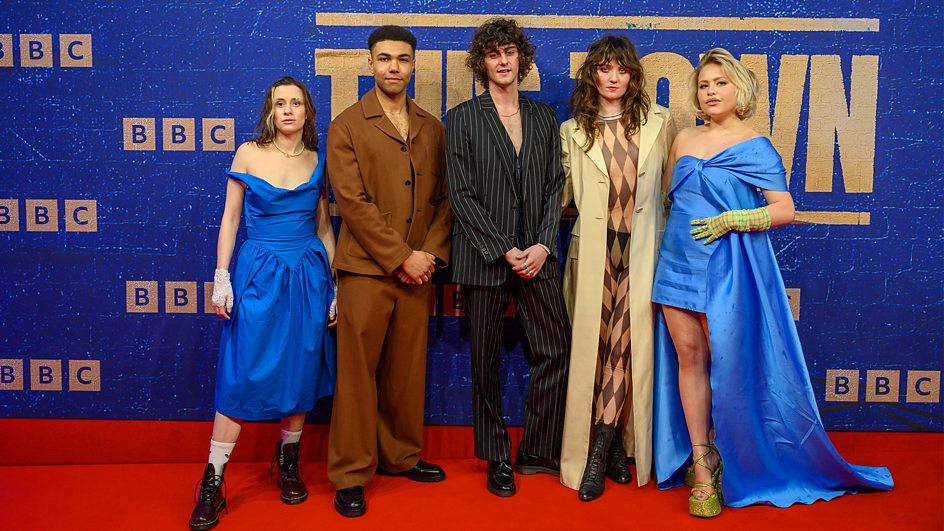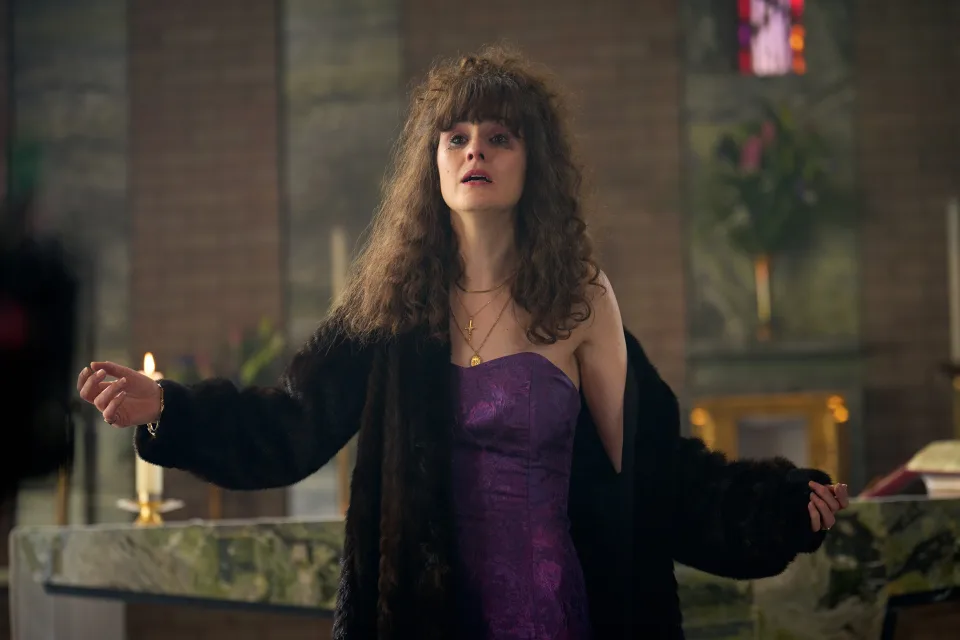This Town was created by the Peaky Binders creator, Steven Knight, and made lyrical by Kae Tempest’s poetry, Dan Carey’s original music, and the pop soundtrack of the period. Some reviewers have questioned how historically accurate it is; others have cavilled at the amount of plot lines it crams in and whether it merits its promotion as an ‘epic’ story. They mistake it for a documentary or some social realist drama. Some people think it compares badly to Peaky Binders.
It drew us into its spell, compelling us to watch it over two evenings. It is an engaging story with a group of young, working class characters at its heart. Put simply, it is all about how these young people coalesce around the central figure, the poet Dante, to form a new band. Dante meets a girl who can create music but lacks the words; he possesses the words but lacks the music. Their efforts are the dominant thread that keeps all the other subplots together. You could not find a more different and original way of telling the story of a band in the film genre.
“It drew us into its spell, compelling us to watch it over two evenings. It is an engaging story with a group of young, working class characters at its heart.”
There are a lot of dramatic threads. Maybe too many. Although I initially felt the gangster subplot was a bit excessive, it ultimately tied in well with the conclusion of the story. Some of the young people are part of an extended family that includes Irish and Caribbean heritage. This opens the drama to plot lines and themes involving the IRA, the British army and the intelligence services, skinhead fights with black youth, the anti-racist riots, the closure of the Jaguar works, local gangsters, father-son conflicts, bereavement, and addiction. Dramatic tension is provided by Gregory, Dante’s brother, who is coerced into becoming a British agent. He works tirelessly to thwart bombings in Birmingham while also striving to shield his family from the IRA’s influence. We are left guessing until the end if he can get away with it. This works as a counterpoint to whether the band can really make it.

Setting up the band and making it a success is the key to the young people’s aspirations to escape. Amid the era of Thatcherism, which eroded the fundamental safeguards of the post-war settlement for the working class, they yearn for a better life. For Bardon, the son of the local IRA leader, the band is a way of escaping his father’s pressure to join the war against the British state. For the girl drummer, it is a way out of her addiction. For Jeannie, the composer, creating music provides an escape from her skinhead boyfriend’s oppressive grip on their relationship.
What holds the story together and transcends any limitations of too many plot lines is Dante and his poetry. He is a truly original character, both a bit weird (f..king strange, as some of his friends say) and likeable. We recognise the neuroses and tribulations of being young, navigating our first sexual relationships, and trying to understand the reality with which we are dealt. His poetry is his attempt to do so.
“What holds the story together and transcends any limitations of too many plot lines is Dante and his poetry. He is a truly original character, both a bit weird (f..king strange, as some of his friends say) and likeable.”
Kae Tempest had done a great job of providing the poetry script. It is worth putting the subtitles on the TV to capture the beauty of the lines. The characters navigate complex emotions using relatable, everyday language. Some of it reminded me of the great albums released by the Streets singer, Mike Skinner. The final scene, where we see the band play a full version of a song for the first time, is truly lyrical and uplifting.
“Kae Tempest had done a great job of providing the poetry script. It is worth putting the subtitles on the TV to capture the beauty of the lines. The characters navigate complex emotions using relatable, everyday language.”
Earlier on, there were some terrific moments. Bardon’s mom, Estella (Michelle Dockery), has been exiled by her IRA husband as a security threat because of her addiction problems. She is determined to attend her mother’s funeral. She shows up shoeless and delivers a scene-stopping rendition of Somewhere Over the Rainbow. It is hard not to be moved to tears.

Hit songs of the era, predominantly from the reggae, ska, and 2-tone genres, punctuate the drama at fitting moments throughout the story. The musical selections not only complement the narrative seamlessly but also provide a delightful nostalgia trip for those who remember the songs from their original release or a pleasant discovery for younger audiences hearing them for the first time.
The cinematographer beautifully filmed the estates and urban landscapes. Who thought a bridge overlooking the M6 could be such a dramatic location—a platform to which Dante regularly returns? When Dante loses his virginity, special effects capture the moment well. Unlike some six-part drama series, the narrative does not flag or get repetitive.
Levi Brown, who plays Dante, surely has made a deserved breakthrough with this role. Steven Knight has delivered an original story about a working class community at a particular time and place. TV and cinema do not do that many decent, thoughtful dramas where authentic working class voices are heard. Let’s hope Kae Tempest keeps writing her poetry. For those who enjoyed the music, you’ll be pleased to know that the series’ soundtrack will be released soon.
In today’s world, it’s questionable whether working class youth have the same opportunities to form bands as they did back in the 1980s. The scarcity of accessible practice spaces and facilities makes it even more challenging for them to pursue their musical aspirations. As we strive for a better future, we must advocate for a society that nurtures and supports everyone’s creative potential, regardless of their family’s financial resources. Let’s actively strive to create a world where everyone, regardless of their background, has equal access to opportunities for personal development and artistic growth, rather than limiting these possibilities to only those from privileged upbringings.
“Let’s actively strive to create a world where everyone, regardless of their background, has equal access to opportunities for personal development and artistic growth, rather than limiting these possibilities to only those from privileged upbringings.”
Art (53) Book Review (121) Books (114) Capitalism (68) China (80) Climate Emergency (98) Conservative Government (90) Conservative Party (45) COVID-19 (44) EcoSocialism (55) Elections (83) Europe (46) Fascism (57) Film (49) Film Review (68) France (70) Gaza (60) Imperialism (100) Israel (124) Italy (46) Keir Starmer (52) Labour Party (111) Long Read (42) Marxism (49) Marxist Theory (48) Palestine (169) pandemic (78) Protest (152) Russia (340) Solidarity (142) Statement (48) Trade Unionism (141) Ukraine (346) United States of America (132) War (368)

